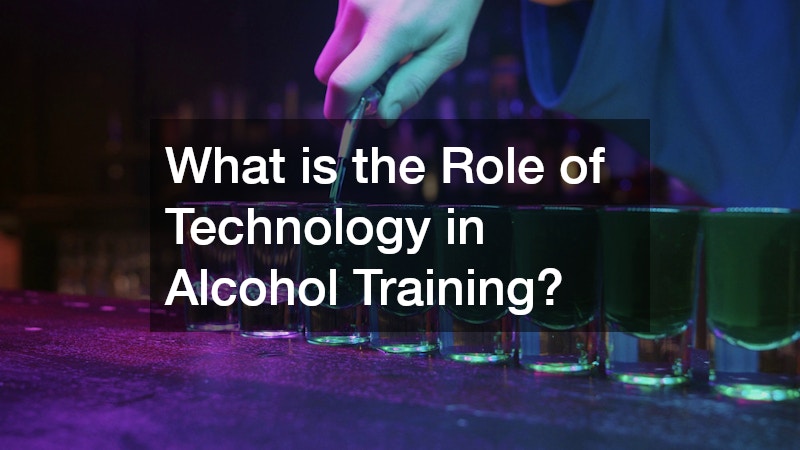
Alcohol training for bartenders is a pivotal component of the hospitality industry. It ensures that bartenders are equipped to provide responsible service, enhance the customer experience, and comply with ever-evolving legal requirements.
Why is Alcohol Training Essential for Bartenders?
Enhancing Customer Safety
Alcohol training provides bartenders with the knowledge to recognize signs of intoxication, helping to prevent over-serving and manage intoxicated patrons effectively. By identifying potential red flags, bartenders can intervene before situations escalate, thus ensuring a safer environment for everyone.
Proper training also instills a mindset of vigilance and responsibility, emphasizing the importance of customer safety. Bartenders learn proactive measures, such as offering water or food to patrons who appear overly intoxicated, further contributing to customer well-being.
Incorporating strategies to deal with intoxicated customers can significantly reduce the likelihood of alcohol-related incidents. This proactive approach benefits both the patrons and the establishment, fostering a harmonious and secure environment.
Understanding Legal Responsibilities
Bartenders are often the first line of defense against legal issues related to alcohol service. Training ensures they understand the gravity of serving alcohol responsibly and the consequences of failing to do so.
Legal responsibilities include knowing the age verification process and adhering to guidelines on when to refuse service. Such knowledge is critical in avoiding fines, legal action, or loss of licenses for the establishment.
Additionally, comprehensive alcohol training covers state and local regulations that bartenders must follow, making them more competent and confident in their roles. Staying informed and compliant protects both the bartender and the business from legal complications.
What Topics are Covered in Alcohol Training Programs?
Alcohol Awareness and Identification
Alcohol training programs emphasize the importance of understanding various types of alcoholic beverages, their strengths, and effects on the body. This knowledge enables bartenders to serve responsibly and educate patrons about drink choices.
Bartenders also learn to recognize the physical and behavioral signs of intoxication, allowing them to make informed decisions when serving alcohol. Such expertise helps create a safer atmosphere and mitigate the risks associated with excessive alcohol consumption.
The ability to identify different types of alcohol and their effects ensures that bartenders can provide informed recommendations to customers, enhancing the overall service experience. This expertise is valuable in building customer trust and satisfaction.
Effective Communication and Conflict Resolution
Training programs equip bartenders with communication skills that are crucial in managing customer interactions effectively. These skills help bartenders de-escalate conflicts, handle complaints, and ensure customer satisfaction.
Effective conflict resolution techniques enable bartenders to maintain a calm demeanor in challenging situations, ensuring the safety of all patrons. Bartenders trained in this way can diffuse tension and return focus to creating a positive and enjoyable atmosphere.
This level of professionalism not only improves the customer experience but also strengthens the establishment’s reputation. Thoughtful communication and conflict management are essential components of successful hospitality service.
How Does Alcohol Training Benefit Establishments?
Boosting Customer Satisfaction
Well-trained bartenders contribute to higher customer satisfaction by delivering a knowledgeable and friendly service experience. Patrons who feel understood and attended to are more likely to become repeat customers.
By understanding customer preferences and offering expert recommendations, bartenders enhance the overall enjoyment of an establishment’s offerings. This personalized service drives customer loyalty and encourages positive word-of-mouth advertisements.
The presence of well-trained personnel demonstrates a commitment to quality, which resonates well with guests. This perception of quality service encourages patrons to return, thus sustaining and growing business over time.
Reducing Liability Risks
Responsibly trained bartenders can significantly reduce liability risks for their establishments. By adhering to best practices and legal guidelines, they help prevent incidents that could result in costly litigation or damage to the business’s reputation.
Understanding the nuances of legal compliance in alcohol service protects the business from potential legal challenges. Well-trained staff ensure strict adherence to age verification processes, preventing the sale of alcohol to minors.
The strategic implementation of these practices minimizes the risk of alcohol-related incidents and reinforces the establishment’s commitment to lawful and responsible operations. This focus on compliance can shield businesses from legal and financial repercussions.
Are There Certification Requirements for Bartenders?
Understanding Different Certification Programs
Certification programs offer bartenders a structured path to gaining the necessary knowledge and skills for responsible alcohol service. These programs vary in scope and specialization, covering essential topics like legal compliance and customer safety.
Such programs ensure that bartenders meet industry standards, enhancing their ability to serve responsibly and confidently. Certifications often encompass both theoretical knowledge and practical skills, providing a comprehensive understanding of the bartending profession.
Benefits of Certification
Certifications elevate a bartender’s credibility, showcasing their dedication to excellence and continuous improvement in their profession. They often lead to better job opportunities, higher earning potential, and increased job stability.
Establishments favor certified bartenders as they bring specialized knowledge and a commitment to responsible service. This preference can translate into swift hiring decisions and career advancement opportunities in the hospitality industry.
What is the Role of Technology in Alcohol Training?
Online Training Platforms
Technological advancements have revolutionized alcohol training, making it more accessible through online platforms. These platforms enable bartenders to complete training at their own pace, offering flexibility and convenience.
Such platforms often provide interactive modules that cover a wide range of important topics, from alcohol safety to legal compliance. This accessibility ensures that bartenders from various backgrounds can enhance their skills regardless of their location.
Interactive Learning and Assessments
Interactive technology in training programs engages learners through simulations and assessments that mimic real-life scenarios. These tools enhance the learning experience, helping bartenders retain information more effectively.
Using interactive elements allows bartenders to practice their skills in a controlled environment, boosting their confidence and competence. This hands-on approach helps bridge the gap between theory and practice, essential for mastering bartending skills.
.

